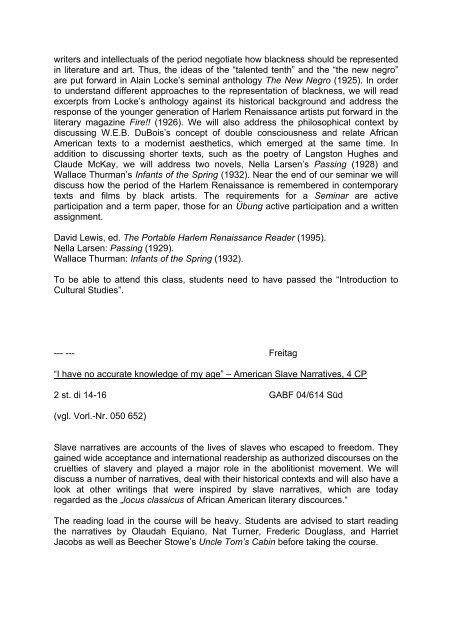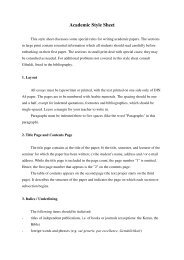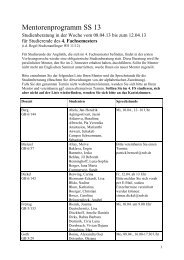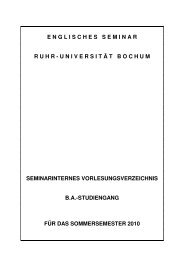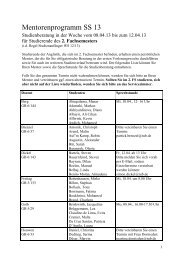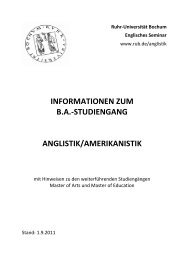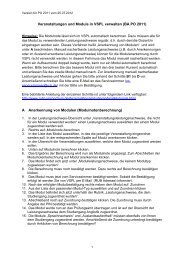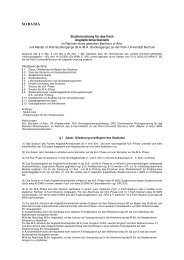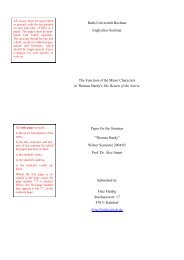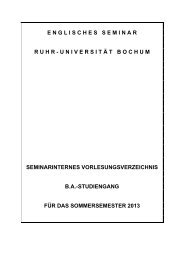Termine im WS 2012/13 - Englisches Seminar - Ruhr-Universität ...
Termine im WS 2012/13 - Englisches Seminar - Ruhr-Universität ...
Termine im WS 2012/13 - Englisches Seminar - Ruhr-Universität ...
Create successful ePaper yourself
Turn your PDF publications into a flip-book with our unique Google optimized e-Paper software.
writers and intellectuals of the period negotiate how blackness should be represented<br />
in literature and art. Thus, the ideas of the “talented tenth” and the “the new negro”<br />
are put forward in Alain Locke’s seminal anthology The New Negro (1925). In order<br />
to understand different approaches to the representation of blackness, we will read<br />
excerpts from Locke’s anthology against its historical background and address the<br />
response of the younger generation of Harlem Renaissance artists put forward in the<br />
literary magazine Fire!! (1926). We will also address the philosophical context by<br />
discussing W.E.B. DuBois’s concept of double consciousness and relate African<br />
American texts to a modernist aesthetics, which emerged at the same t<strong>im</strong>e. In<br />
addition to discussing shorter texts, such as the poetry of Langston Hughes and<br />
Claude McKay, we will address two novels, Nella Larsen’s Passing (1928) and<br />
Wallace Thurman’s Infants of the Spring (1932). Near the end of our seminar we will<br />
discuss how the period of the Harlem Renaissance is remembered in contemporary<br />
texts and films by black artists. The requirements for a <strong>Seminar</strong> are active<br />
participation and a term paper, those for an Übung active participation and a written<br />
assignment.<br />
David Lewis, ed. The Portable Harlem Renaissance Reader (1995).<br />
Nella Larsen: Passing (1929).<br />
Wallace Thurman: Infants of the Spring (1932).<br />
To be able to attend this class, students need to have passed the “Introduction to<br />
Cultural Studies”.<br />
--- --- Freitag<br />
“I have no accurate knowledge of my age” – American Slave Narratives, 4 CP<br />
2 st. di 14-16 GABF 04/614 Süd<br />
(vgl. Vorl.-Nr. 050 652)<br />
Slave narratives are accounts of the lives of slaves who escaped to freedom. They<br />
gained wide acceptance and international readership as authorized discourses on the<br />
cruelties of slavery and played a major role in the abolitionist movement. We will<br />
discuss a number of narratives, deal with their historical contexts and will also have a<br />
look at other writings that were inspired by slave narratives, which are today<br />
regarded as the „locus classicus of African American literary discources.“<br />
The reading load in the course will be heavy. Students are advised to start reading<br />
the narratives by Olaudah Equiano, Nat Turner, Frederic Douglass, and Harriet<br />
Jacobs as well as Beecher Stowe’s Uncle Tom’s Cabin before taking the course.


